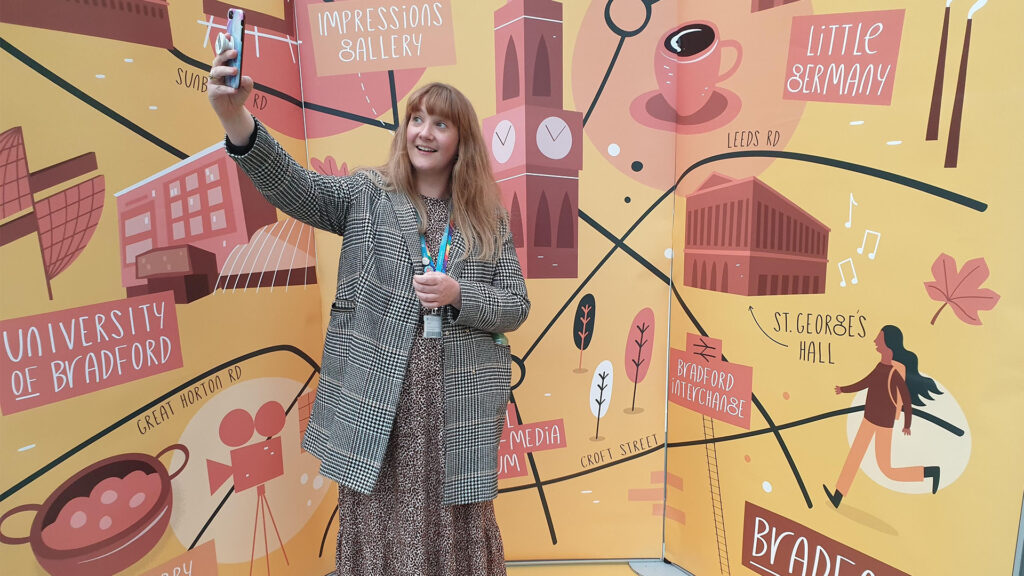Disability History Month: When life gives you melons, you might have dyslexia

As someone with a learning difference that affects reading, writing, and spelling, the irony of writing a blog about dyslexia is far from lost on me. But that’s dyslexia for you, even the word is ironic… what sadist came up with that spelling!
It was, indeed, the irony of laughing one too many times at my own misreading of tragic newspaper headlines that finally made me question why my friends, family and colleagues weren’t seeing the world (and words) as I did. I finally got the answer one dreary afternoon sat in staff training at the Leeds-based specialist higher education institution where I worked for. The wonderful learning support team were raising awareness about dyslexia and as each slide moved on, I just knew the presenter was talking about me.
But there is a real difference between thinking and knowing, and it took me a further two years to pluck up the courage to arrange an assessment.
I was in my early 30s by that point and running a busy communications department for the Yorkshire Dales National Park Authority. I had convinced myself that officially being dyslexic would be the end of my career. Regardless of the hard-earned and well-deserved position I’d reached, a diagnosis would reveal me as an imposter. Someone with no business crafting copy for a living. I’d be out for sure.
I’ll be honest though; I had felt like an imposter many times already. Deliberately making my hand-written notes even messier to hide the terrible spelling from those sat next to me, choosing local landmarks to meet friends by rather than named streets as the words meant literally nothing to me, referring to a mole on my wrist to know the difference between left and right, and having to write down any task that was more than three actions as I was guaranteed to forget it otherwise, all added up to being one big fraud.
Eventually, I reached a tipping point where knowing couldn’t be any worse than how I was feeling about my own coping mechanisms and negative self-talk. And I was right. The sense of relief as I left my assessment with not only one diagnosis, but two – I was both dyslexic and had dyspraxia – was beyond imaginable. It was like I had been given permission to just be who I was rather than fighting it or trying harder and harder to fix something that was hard-wired into me. I felt like I was finding missing parts of me and my history as I made sense of this new definition of who I was.
In the decade or so since the assessment, I’ve cleared the negative self-talk, leaving room to celebrate my strengths. I’ve truly grabbed each opportunity that this has brought, even studying a second undergraduate degree in visual communication and going on to become Digital & Content Manager at the University of Bradford, where I was not only responsible for the creative services but also a copywriting team! I’ve also embraced my weaknesses and can recognise now, rather than struggle through, when I might need to give myself longer for a task or put some interventions in place to keep things on track, or even recommend a project for someone else to manage despite wishing to do it myself.
As an adult learner, having the diagnosis and being able to access student support at Leeds Arts University, and the Disabled Student Allowance (DSA) through Finance England, was a lifeline. After three years I left with a First, a 92% mark for my dissertation, and a sinking feeling as I reflected on my six GCSEs and two A levels about what paths could have opened to me earlier if I’d been diagnosed in childhood.
The sinking feeling happened again more recently when the news of 50% funding cut for arts and design courses broke. On these courses as many as 1 in 3 students are likely to have dyslexia and/or dyspraxia, compared to 1 in 10 in the general population. Of course, dyslexia can lead to many successful careers outside of the visual and creative industries – think Stephen Hawking, Steve Jobs, Richard Branson – but these cuts don’t seem to acknowledge or foster the skills that neurodiversity offers or the value thinking differently can bring to culture and industry.
Dyslexia is oftentimes poorly understood and not very often celebrated. I try to address this by being transparent about my own diagnosis, chatting with colleagues about their learning and working styles, and, as Student Recruitment Marketing Manager at Loughborough, ensuring that neurodiversity is always part of marketing’s equality, diversity and inclusion conversations. Just as a dyslexic brain thinks differently, we need to think about dyslexia differently too and work together towards a dyslexia-friendly society.
Kate Green
Student Recruitment Marketing Manager
This blog post has been published as part of the University’s Disability History Month campaign, which aims to raise awareness of staff and student experiences as well as share a wide range of supportive resources and initiatives for the University community.
Any staff member with a physical or hidden disability is welcome to join the Staff Inclusivity Group, which advocates for equality in the workplace for colleagues with physical or invisible disabilities. The group is also a place to seek support from one another and challenge University policies and practices.
Equity, Diversity and Inclusion
Reflections, comments, discussion and opinion on EDI topics from Loughborough University staff and students